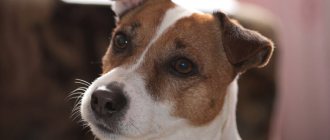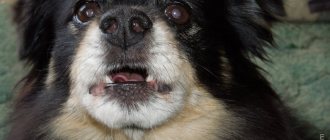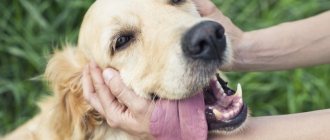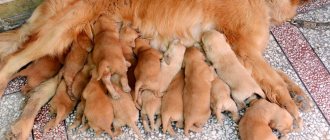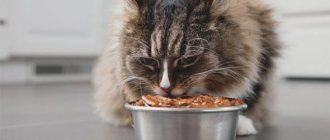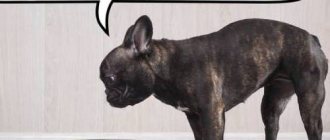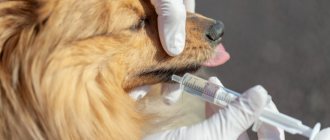Raising a beautiful, healthy and well-mannered dog is not easy. Feeding, walking, toilet training and basic commands - all this requires complete dedication from the owner for several months. Fortunately, the issue of preparing a diet today is solved simply: ready-made industrial feeds are perfectly balanced and can provide four-legged babies with everything necessary for development and growth.
However, sometimes owners complain that the puppy does not gain weight on dry food. Let's look at the common causes of this problem and tell you what measures can be taken.
Is there a problem?
First you need to understand whether there is cause for concern. Dogs differ from each other in growth rates and constitution. Representatives of small and medium breeds reach adult body weight by 6–9 months, while their large counterparts grow up to 18 months and sometimes up to two years.
Don't forget that breeds were bred for different purposes. For example, pointers and greyhounds are supposed to be “thin and loud” by status, otherwise they simply could not run so fast. What is a normal constitution for other breeds is already overweight for them. In addition, such dogs have very light bones, due to which they always weigh less than representatives of other breeds of the same height at the withers.
Please note that all puppies lose their so-called “baby plumpness” by the age of 4–5 months. At the same time, the increase in height and weight occurs spasmodically. Often the growth of tubular bones is so much faster than the growth of muscle mass that the dog looks like a “stork” with excessively long and thin legs. However, over time, the situation gradually improves, and the animal acquires a harmonious physique characteristic of its breed.
Find out what your puppy's physical development should be by his age. You can find out this information from your breeder, on breed forums, and thematic information sites. If all parameters are within the normal range (or even at its lower limit), there is nothing to worry about.
Important
You should not feed your puppy treats and natural products in addition to dry food: this will only upset the balance of substances in the diet and provoke digestive disorders.
Video “What to feed a dog?”
The following video, taken from the “Expert Speaks” channel, should help you create the right diet.
Sorry, there are no surveys available at this time.
Was this article helpful?
Thank you for your opinion!
The article was useful. Please share the information with your friends.
Yes (100.00%)
No
X
Please write what is wrong and leave recommendations on the article
Cancel reply
Rate the benefit of the article: Rate the author ( 4 votes, average: 4.50 out of 5)
Discuss the article:
Daily norm and feeding regimen
Manufacturers of ready-made dog diets always indicate daily feeding dosages on the packaging. If the puppy does not gain weight on dry food, check that the specified norm is being followed correctly. You shouldn’t trust your eye: it’s better to arm yourself with a measuring cup or an accurate kitchen scale. This is the only way you will be able to fully control your pet’s diet. Do not forget that the standards on the packages are average: they do not take into account the physical activity of the animal, as well as the conditions of its detention.
Puppies that run, exercise, or live outside a lot need more calories than their couch potatoes. It is permissible for them to increase the daily norm by 10–20% of the recommended one. If the weight does not grow even with enhanced nutrition, it is worth looking for another reason.
Feeding regimen is no less important. Puppies are fed 3–5 times a day (depending on age), with the daily dosage divided into equal portions. It is not advisable to put dry food in a bowl for the whole day, as dogs instinctively strive to absorb all the food that is available to them. When a puppy overeats, its fragile gastrointestinal tract cannot cope with the load. As a result, food is not digested properly and the body does not receive enough important nutrients.
Causes of weight loss
Alas, the most common reason is a simple lack of food. Dogs picked up by kind people on the streets are simply starving and because of this they can barely move their paws. Having taken a stray dog from the street, it is very important to help him quickly gain weight by ensuring proper fattening.
Another common cause is illness. In some cases, it affects the gastrointestinal tract, and the pet simply cannot eat normally or digest food. In other cases, due to illness or associated pain, the animal loses its appetite and rapidly loses weight.
Parasites deserve special mention.
They suck all the juices out of the unfortunate dog - he actively eats and still quickly loses weight. Important! Thinness should not be confused with natural conformation - for example, many greyhounds and some other dog breeds are, in principle, very thin - this is the norm for them.
Moreover, these are dogs whose light weight helps them develop high speed and maintain this pace for a long time. In addition, the following problems lead to exhaustion:
- simultaneous rearing of 10 or more puppies by one bitch,
- old age,
- dysbiosis.
Finally, we must not forget about improper distribution of food. For example, if several animals live in an apartment, then the largest dog can drive away less aggressive brothers and eat their food. Of course, he will actively gain weight, and they will lose weight. To prevent this from happening, it is necessary to monitor your pets during feeding.
Dry food is not suitable for the puppy, so it does not gain weight
The dog is a carnivore and should eat mainly meat. Therefore, foods high in carbohydrates are absolutely not suitable for her. This person gains weight well on porridges and pancakes, but the dog’s body is structured differently. Her saliva does not contain enzymes that begin to break down carbohydrate foods before they enter the stomach. In addition, the intestines of predators are approximately half as long as those of humans, and the microflora is much less saturated. Therefore, their digestive system does not cope well with digesting plant foods, especially grains.
The main source of energy for a dog is fats and proteins, which determines its nutritional needs. If you feed your puppy dry food based on cereals, he may eat a large amount of food, while gaining weight is extremely difficult. We recommend using biologically appropriate food for dogs, that is, one that meets their needs as carnivores. This is not only the key to good physical fitness, but also the prevention of many diseases.
It is important for puppies to receive a sufficient amount of meat and animal fats, because the nutrients that they do not receive now (during the growth period) cannot be compensated for in the future.
Some owners do not agree that carbohydrate foods interfere with weight gain. They cite the example of stray dogs who eat whatever they can without looking skinny. Here it is important to realize that such dogs have gone through strict natural selection and have adapted to unfavorable conditions and food that is unusual for them. Where is the guarantee that your pet would be among the survivors?
Choosing the right food
When choosing a ready-made diet, you need to focus not on the indicators of the guaranteed analysis, but on the first 5 positions in the list of ingredients: they form the basis of the product. If it's meat or other sources of animal protein (fish, eggs, herbivore and poultry entrails), then everything is fine. We wrote earlier about which dry food is best to feed a puppy.
Vitamins for weight gain
In addition to a properly formulated diet, special vitamins can also help an exhausted dog gain weight. A pet's body always needs nutrients, many of which are not found in the animal's usual food. If the main goal is to gain weight for your pet by increasing muscle mass (the most acceptable option), then it is better to give preference to the following vitamin complexes:
- "Wolmar". The drug contains 18 amino acids, 12 vitamins and minerals that have a beneficial effect on the growth of muscle cells. The main task of this vitamin supplement is to activate protein synthesis in muscle tissue, which allows you to increase the total muscle mass, and therefore the weight of the animal. In addition, vitamins supply the dog’s body with the energy the pet needs during increased physical activity.
- "Protevit plus" - vitamins recommended to prevent metabolic disorders in the body. The drug contains protein, potassium, magnesium, linoleic acid, vitamin C, K, and a protein metabolism stimulator. All these components have a beneficial effect on all processes in the dog’s body, increasing the performance and endurance of the pet.
As in the case of the optimal food mixture, only a doctor can suggest the ideal type of vitamin supplements for a particular dog, based on the pet’s condition and the presence of any concomitant diseases.
We advise you to read more about the meaning and criteria for choosing vitamins for dogs.
When there is cause for concern
A thin physique in itself is not a marker of poor health. On the contrary, extra pounds place additional stress on the fragile skeleton and force the puppy to move less, which significantly reduces the ability to understand the world around him. All this negatively affects not only physical, but also mental development.
You should sound the alarm if a thin puppy has other signs of illness:
- decreased interest in games;
- lethargy and drowsiness;
- bowel disorder.
In these cases, it is reasonable to contact a veterinary center for a detailed examination, and then act according to medical recommendations.
True wasting (cachexia) is a relatively rare phenomenon and is difficult to confuse with a lean physique. In this condition, the animal’s body resembles a skeleton: the ribs protrude, the muscles rapidly collapse, leaving only skin and bones. Appetite may or may not disappear. In the second case, the puppy eats, but does not gain weight.
Cachexia is accompanied by various diseases: oncological, cardiovascular, endocrine, neurological, infectious. The diagnosis can only be made by a veterinarian, so the puppy should be shown to him as soon as possible.
Visiting the veterinarian
Finally, remember that different dog breeds often have different ideal weights and body shapes. For example, a Greyhound will always look slimmer than a Labrador Retriever. However, the best thing you can do if you are concerned about your pet's weight is to take it to a veterinarian. They will give you the best advice regarding the breed and health of your dog. When visiting the veterinarian, it is recommended to bring :
- Record their weight loss if you weighed them regularly;
- The packaging of any meals and treats you give them, as well as how often you offer them that food;
- Record any potential additional symptoms;
- Recording how much they have eaten of the food you give them;
- Record their activities and exercises.
: .
conclusions
The reasons why a puppy does not gain weight on dry food can be quite serious and should not be overlooked. However, the problem often turns out to be far-fetched. Some owners want to see their pet still the same fluffy ball that they once brought home. But the puppy inevitably grows and develops, turning into a teenager, and then into an adult dog. Being overweight will not bring him any benefit, and may even create additional difficulties, problems with health and well-being.
Features of nutrition for recovery after illness
If the dog has simply been sick for a long time and now needs to be fattened, it is best to resort to regular high-calorie food. But it should be relatively liquid - the ideal choice would be porridge with a consistency similar to puree soup. On the one hand, they are easily digestible. On the other hand, they do not need to be chewed, expending additional energy.
It’s a little more difficult if the dog’s gastrointestinal tract is disrupted, for example, due to dysbiosis. She can eat actively, but still lose weight. Well, even the best food won't help here. First you need to restore the balance of bacteria. To do this, the dog needs to be actively fed fermented milk products - the best choice would be kefir, or even better - homemade yogurt. After a few days, the problem will be solved and the dog will quickly gain weight with a normal diet.
On a note! During fattening, you cannot combine meat with dairy products - calcium interferes with the absorption of iron. It is better to give them at intervals of several hours.

